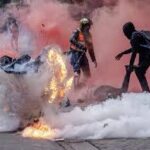On May 19, 2025, widespread disinformation claiming a military coup was underway in Ivory Coast flooded social media platforms, triggering panic and global concern. While the claims were entirely false, the rumors were so convincing that residents like Mafalda Marchioro in Abidjan received anxious messages from friends abroad checking if she was safe. Viral videos many of them AI-generated or re-edited from unrelated conflicts, were viewed by millions, with headlines falsely declaring that President Alassane Ouattara was missing and that the country had fallen into military hands.
This orchestrated falsehood marks a dangerous trend of disinformation campaigns targeting West African nations, especially those holding pro-Western stances. Ivory Coast, a key ally of Western powers and one of the few French-speaking countries in the region that has not succumbed to military rule, is preparing for critical presidential elections later this year. President Ouattara, who is reportedly seeking a controversial fourth term, has drawn criticism from pan-Africanist circles who view him as aligned with foreign interests that exploit the continent.
According to Ivory Coast’s Communications Minister Amadou Coulibaly, the origins of the fake coup story were traced to neighboring countries, though he stopped short of naming them. Analysts suggest a rift with Burkina Faso, whose military leader Captain Ibrahim Traoré, seized power in 2022, may be at the root. Relations between the two nations have deteriorated significantly over accusations that Ivory Coast harbors dissidents and militants.
The BBC Global Disinformation Unit’s investigation found that the earliest viral post about the fake coup came from Harouna Sawadogo, a pro-government influencer in Burkina Faso with over 200,000 TikTok followers. He urged Ivorian soldiers to rise up and falsely claimed that a coup was in progress. He later used manipulated footage, actually from clashes in Kashmir to support his narrative. Despite being presented with evidence debunking the story, Sawadogo doubled down, stating his hope for a coup against President Ouattara.
Other figures amplified the hoax across language barriers and geographies. Turkish-born South African activist Mehmet Vefa Dag, known for controversial and conspiratorial statements, celebrated the fictitious coup and declared support for military regimes in Burkina Faso, Mali, and Niger. He insisted to the BBC that a coup had indeed taken place, even after the claims had been discredited.
YouTube, TikTok, X (formerly Twitter), and Facebook were inundated with misleading videos and infographics that portrayed the coup as real. The most widely circulated videos were shared by channels promoting pan-Africanism and the leadership of Captain Traoré, reflecting a growing trend of romanticizing military takeovers as a form of anti-imperialist resistance.
Experts are raising red flags about how disinformation campaigns are eroding public trust in democratic institutions across Africa. Alex Vines of Chatham House noted that such campaigns are meant to delegitimize elected governments and exploit young people’s frustration with corruption and poverty. Effiong Udo, president of the Pan-African Dialogue Institute, explained that influencers pushing these narratives often gain popularity and monetize their content by appealing to disillusioned youth who desire radical change.
While there is no direct evidence of Russian involvement in the Ivory Coast case, similar tactics were reportedly used by Russian-linked networks, including the Wagner Group, to stir unrest in Niger in 2023. The situation also highlights how AI-generated content and deepfakes are becoming potent tools in geopolitical disinformation.
Kenyan political analyst Prof. Karuti Kanyinga echoed the concern, stating that the appeal of military leadership stems from a broader desire for African leaders who are accountable, transparent, and committed to improving living conditions. However, he cautioned against the glorification of juntas as a path to progress.
As Ivory Coast gears up for its presidential elections, the incident underscores the urgent need for digital literacy, content verification mechanisms, and regional cooperation to combat the spread of fake news. With young, impressionable audiences across Africa increasingly engaging with such content, experts warn that unchecked disinformation could destabilize democracies, embolden authoritarian actors, and deepen regional tensions.
This incident is a powerful reminder of the real-world impact of online misinformation and the responsibility of both governments and tech platforms to protect public discourse in Africa’s digital age.














Leave a comment